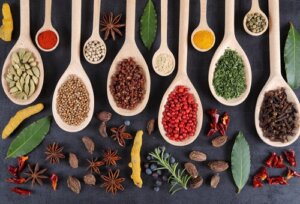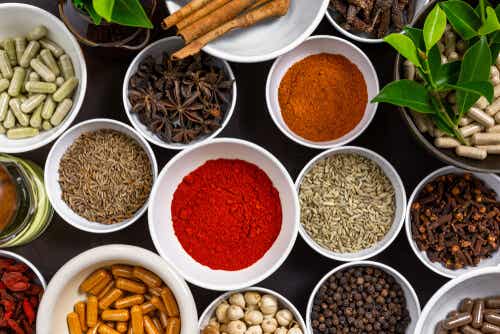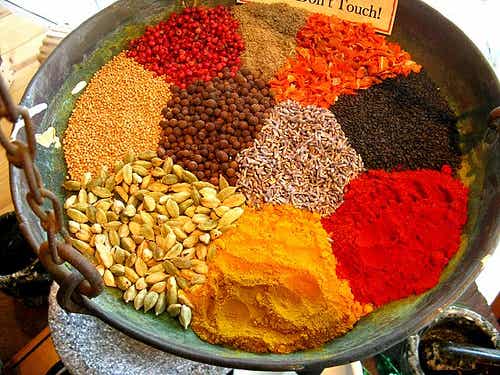Spice Allergies: How to Know if You're Allergic


Written and verified by the nutritionist Saúl Sánchez Arias
Spice allergies aren’t very common. That said, the most common spice allergies are the ones related to fruits with fuzzy skin, dairy products, or proteins that can be found in some cereals.
However, any substance can cause an autoimmune reaction in the organism. For this reason and to avoid major complications, you have to know the symptoms of these processes, as well as their origin.
Food allergies manifest themselves with symptomatology that can sometimes be diverse:
- Some produce irritations at the gastrointestinal level, which can cause transit problems such as gas, pain, and diarrhea.
- In other cases, the symptoms may occur at the epidermal level: small pimples or welts appear in the superficial layers of the skin causing itching and stinging.
Spices are rich in phytonutrients
Spices are common culinary ingredients in almost every cuisine. They don’t provide a significant amount of macronutrients. However, they contain a multitude of phytochemical compounds with a marked antioxidant power.
One example is turmeric. This spice contains a substance, curcumin, that can reduce the risk of developing complex diseases, according to a study published in the Journal of Alzheimer’s Disease. For this reason, doctors don’t recommend consuming it on a regular basis.
However, these ingredients don’t agree with everyone and some people are allergic to them. This means that this person has spice allergies. In this type of individual, antioxidants must be provided by other foods, such as vegetables.

Learn more: 5 Natural Spices to Help Combat Knee Pain
Symptomatology of spice allergy
Food allergies usually present the following symptoms:
- Stomach pain
- Gas
- Diarrhea
- Tingling mouth
- Itching
- Swollen lips or tongue
If you suffer any of these symptoms after ingesting a particular spice, it’s quite likely that you are allergic to it. However, you may need a complementary test to complete the diagnosis. A specialist is in charge of carrying it out.
The doctor can subject you to both provocative tests and blood tests. This way, they can check whether you’re particularly sensitive to a specific spice. If the diagnosis is positive, you should stop consuming this spice. Otherwise, intestinal problems may occur.
Also read: Living with Dust Allergy
Reducing the severity of a spice allergy
There are certain mechanisms that can improve the symptomatology of an allergy. One of them is administering probiotics. Intestinal dysbiosis may be responsible for some of the autoimmune reactions.
Thus, administering probiotics to improve the biodiversity of the microflora could contribute to reducing the severity of these processes, according to a study published in the journal Maturitas.
Some anti-inflammatory nutrients could also reduce the processes associated with intestinal disorders generated from the ingestion of an allergy-causing food. Therefore, specialists recommend consuming foods rich in omega-3 fatty acids, as well as in antioxidants or flavonoids such as polyphenols.

Early diagnosis is important in allergies
If you suspect you have spice allergies, visit a specialist as soon as possible. They’ll perform diagnostic tests to confirm it.
If the result is positive, the first option is to remove these ingredients from your diet. From here, it’s possible to try treatments with probiotics or anti-inflammatory foods.
However, if you have to eliminate the intake of a particular spice, try to provide phytonutrients in other ways. Increasing vegetable intake is often the best option. Red vegetables are rich in flavonoids, which have a strong antioxidant and anti-inflammatory character.
Remember that the basis of a balanced diet is variety. In conclusion, the greater the variety, the better the diet. If you have to restrict foods, the best option is to always try to replace them with other foods that offer similar health properties.
In spite of everything, spices are highly recommended ingredients in the framework of a healthy diet. Unless your doctor advises against it, it isn’t advisable to exclude them.
All cited sources were thoroughly reviewed by our team to ensure their quality, reliability, currency, and validity. The bibliography of this article was considered reliable and of academic or scientific accuracy.
- Tang M., Taghibiglou C., The mechanisms of action of curcumin in Alzheimer’s disease. J Alzheimers Dis, 2017. 58 (4): 1003-1016.
- Dargahi N., Johnson J., Donkor O., Vasiljevic., Apostolopoulos V., Immunomodulatory effects of probiotics: can they be used to treat allergies and autoinmune diseases? Maturitas, 2019. 119: 25-38.
This text is provided for informational purposes only and does not replace consultation with a professional. If in doubt, consult your specialist.








